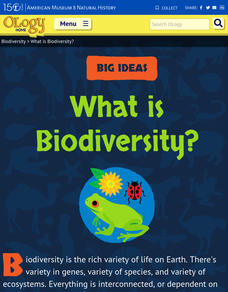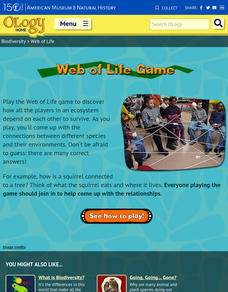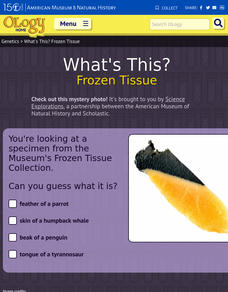American Museum of Natural History
What's This? Colorful Creatures
An online resource shows learners some species that are very good at using their camouflage as well as other ways species use their coloring for survival. Interactive and digital, the lesson is perfect as a remote learning resource.
American Museum of Natural History
What's This? Breathing
Crazy fact: Some animals can survive months without oxygen. An online resource describes some unique ways animals collect oxygen and even live without it for an extended time. Learners read about these special animals and use pop-up...
American Museum of Natural History
They Glow!
Would you believe marine animals can make their own light? An online resource describes the process of bioluminescence and how animals in the ocean use it to survive. The lesson features a catchy tune that describes the behavior of ocean...
American Museum of Natural History
Talking to Fireflies
Fireflies are more than just mobile twinkle lights. An online interactive lesson teaches individuals about the light patterns fireflies use to communicate with each other. After they practice the patterns themselves, they could be...
American Museum of Natural History
Saving Species
Some scientists dedicate their lives to researching and protecting endangered species. An online lesson teaches about three scientists around the world who do just that. They learn about spiders, mollusks, and reptiles from North...
American Museum of Natural History
Welcome to the Dzanga-Sangha
One ecosystem is home to numerous habitats—how diverse are they? Pupils interact with an online lesson to explore three habitats in a rain forest ecosystem. They discover connections between species and how they depend on each other for...
American Museum of Natural History
What's This? Feeding
Some species have pretty creative methods for catching food. Young scientists learn about some interesting ways organisms get the nutrients they need by navigating an online interactive lesson that would be suitable for a remote learning...
American Museum of Natural History
What's This? Staying Safe
Amaze the class with the creative adaptations species employ to trick predators. An online interactive lesson introduces learners to six different species with unique adaptations. Each species highlights a different adaptation and its...
American Museum of Natural History
Ocean Creature Feature
From coloring to hard protective shells, ocean creatures have adaptation features that help them survive. An eight-question online quiz highlights different ocean animals and their unique characteristics. The resource then offers pop-up...
American Museum of Natural History
Around the World with DNA
DNA analysis could be what saves some animals from extinction. An interactive lesson shows learners how DNA information proves variation among animals of the same species and how stakeholders use that information to make decisions. Easy...
American Museum of Natural History
What is Biodiversity?
Not all dogs are the same just like not all finches are the same. An interactive online lesson helps individuals learn about the causes and limitations to biodiversity. The clickable sections describe the basics of the genetics of...
American Museum of Natural History
What do you know about Biodiversity?
What do your classes know about biodiversity? A 10-question online quiz asks questions related to biodiversity and species groups. As learners answer questions, they click on links to additional information. The lesson could be an option...
American Museum of Natural History
Web of Life Game
Get caught in a web of learning. Classmates play a game to build a web to model the interaction of species that live in a specific ecosystem. They each assume the role of one species and work together, passing a ball of twine to indicate...
American Museum of Natural History
The Tree of Life
Groups of species can have more in common than meets the eye. An interactive cladogram shows some of the connections between important groups of species. Learners click on sections of the diagram to learn more about the connections or on...
American Museum of Natural History
What do You Know About Marine Biology
Show me what you know about the sea. Learners answer 10 questions about marine biology. The questions range from what evidence points to the origin of life to the biggest threat to oceans.
American Museum of Natural History
Find My Plankton Baby Picture
Get a better understanding of babies in the sea. The class learns about the two kinds of plankton. They then determine the baby pictures of eight marine animals given a picture of the adult and some hints about the larvae. When scholars...
American Museum of Natural History
Dive Into Worlds Within the Sea
Make connections between ocean organisms. Individuals explore three different ecosystems in the ocean. With an online interactive, they learn how different organisms depend upon each other. Learners first answer questions to connect...
American Museum of Natural History
Journey to the Bottom of the Sea
Follow the path to the sea floor. Pupils play an online interactive board game to reach the bottom of the sea. Participants must match descriptions of creatures to a property of water dealing with oxygen, food, light, or density to move...
American Museum of Natural History
What's This? Frozen Tissue
Take a peek into thousands of frozen samples. Learners try to identify an image of a piece of frozen tissue. After choosing the correct answer, scholars find out more information about the American Museum of Natural History's Frozen...
American Museum of Natural History
What's the Big Idea About Genetics?
Here's a quick read on genetics. An engaging online resource provides six slides of information about genetics. Learners read about the meaning of genetics to information about DNA. They also learn about the study of genes and the...
American Museum of Natural History
What Do You Know About Genetics?
Just what do you know about genetics? The online resource contains 10 questions about genetics. Scholars work through the questions ranging from what DNA stands for to how much of human DNA is similar to that of a fruit fly. Scholars...
American Museum of Natural History
Differentiate! The Stem Cell Card Game
Let the games grow. Groups play a card game to grow cells. Players start growing cells from stem cells to create specialized cells in the human body. Learners use full-grown cells from the human body to create stem cells in the lab to...
American Museum of Natural History
A Nature and Nurture Walk in Mendel Park
We are what we make of ourselves ... sometimes. Learners play a game to come up with the answer to a riddle. The game consists of determining whether different scenarios are due to nature or nature and nurture. With each correct answer,...
American Museum of Natural History
Express Yourself
Emotions are written all over your face. Pupils match six emotions with full facial expressions in an engaging online interactive. The scholars move on to align the same six emotions with only the expressions from the eyes by dragging...

























